Martin Edwards's Blog, page 73
June 25, 2021
Forgotten Book - The Rainbird Pattern
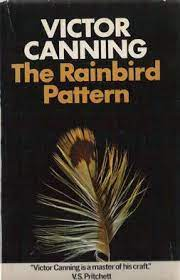
A little while ago, I was pleased to lay my hands on an inscribed first edition of Victor Canning's The Rainbird Patten (1972). The jacket bears an encomium from V.S. Pritchett, no less: 'Victor Canning is a master of his craft'. That was the craft of thriller writing, and Pritchett wasn't a lone voice. Over the course of his long career, Canning wrote plenty of entertaining mysteries. John Higgins, a great expert on his work, regards this particular book as his masterpiece.
I first became aware of it many years ago, when I watched Hitchcock's last film, Family Plot, and discovered that it was based on The Rainbird Pattern. Loosely based, it seemed, and having enjoyed the film (which is essentially a black comedy) I was interested to read the book. At long last I've got round to it, and though it is very different from the film, which I really must watch again, I did enjoy it.
There are two distinct plot strands, which gradually intertwine. A kidnapper called The Trader is being pursued by the secret service men Bush and Grandison. Meanwhile, Blanche Tyler, a medium, and her lover George Lumley, are trying to pull the wool over the eyes of a wealthy woman called Miss Rainbird. The kidnapping plot is mildly interesting, but for me the book really comes alive in the sections dealing with the relationship between Blanche and George, and their connection with Miss Rainbird. These three are great characters, much more enticing to read about than either the Trader or Bush and Grandison.
In the later stages of the book, there is a shocking development, and the story continues to develop in an unpredictable way. The ending is chilling and memorable. This book earned Canning a Silver Dagger from the CWA (the Silver Dagger was essentially a runners-up award to the Gold Dagger, but was discontinued years ago). This success, and the quality of the film version, means that The Rainbird Pattern definitely should not be a forgotten book. That inscription, by the way, was to Leigh Crutchley, an actor who did quite a bit of work for the BBC at around the time when several of Canning's thrillers were being broadcast on the radio.
June 23, 2021
The Hitch-Hiker - 1953 film review
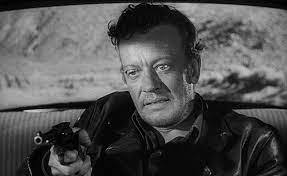
The origins of the storyline are complex. The main source was a short story by Robert Joseph, which in turn drew on Build My Gallows High by Geoffrey Homes (the pen-name of Daniel Mainwaring). Mainwaring, a very good writer, also contributed to the screenplay. Ida Lupino added a further ingredient to the mix by introducing material based on the crimes of a recent real life spree killer, William Edward (Billy) Cook, who murdered six people in 1950, prompting a large-scale manhunt.
Two friends called Roy and Gilbert (played by Edmund O'Brien and Frank Lovejoy) are driving along with a view to going fishing for a few days when they stop to help a stranded motorist whose car has broken down. Unfortunately, they have been conned. The chap they want to help has stolen the car after killing and robbing its owner, and has committed similar crimes in the past. He is Emmett Myers (Frank Talman, a truly mesmerising performance) and he has a gun.
A long drive through the desert - vividly evoked, even in black and white - follows. The tension mounts as the authorities close in on Myers. The captives make various rather inept attempts to escape, and their own relationship comes under pressure as it becomes clear that Myers is simply using them - once he has achieved his objective, he will dispose of them. It's an admirably short, snappy film, but I felt Lupino could have developed the characters and storyline further. I suspect that her determination to achieve a degree of 'this could happen to you' realism was an inhibiting factor. Overall, I think it's pushing things too far to claim this film as a masterpiece, but it's undeniably gripping and well-made.
June 21, 2021
Research and Relaxation

In this blog, I've often talked about my trips, which have introduced me to many wonderful places and also been a fruitful source of inspiration for my fiction. The pandemic has of course changed everything and this looks like being the second year in succession when I don't venture out of Britain. But to the extent that it's possible, I do like to get about my own country and I've started doing that since the easing of lockdown began.
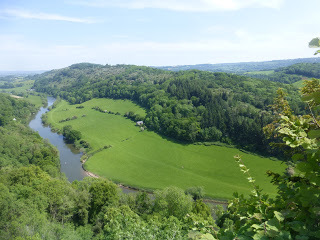
As in the past, I've enjoyed combining the relaxation of enjoying pleasant places with a bit of research. A visit to north Wales did give me some material for a 'bibliomystery' that I've been commissioned to write. It's called The Traitor, and I'll talk more about that at a later date. I've also had a pleasant stay in Herefordshire and the Wye Valley, and a visit to Shropshire en route again provided scenes and references for The Traitor.
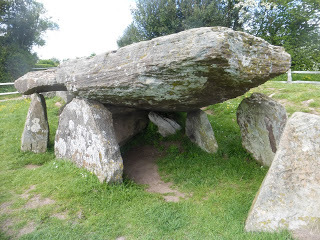
While I was in the Wye Valley, I discovered a number of intriguing spots, including the ancient burial chamber Arthur's Stone (photo above) and Longtown Castle (photo below), as well as a gorgeous gorge - Symonds Yat, where we went on our first boat trip for ages. A trip to that part of the world wouldn't be complete without a visit to Hay-on-Wye, and although some bookshops have sadly vanished since the last time I was there, plenty still remain and I had a good browse.
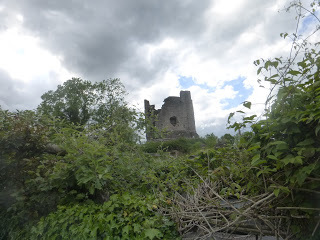
For the first time, I explored the Forest of Dean, and the wonderful sculpture trail through the forest. There was also a trip to Lydney Harbour, a quiet and atmospheric spot on the river Severn.

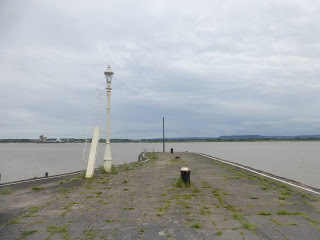
In Abergavenny, I took at look at the birthplace of Ethel Lina White, who wrote so many lively suspense novels in the 30s and 40s. Other highlights included the black and white villages of north Herefordshire, a lovely water garden, and Tenbury Wells, which I'd never been to previously. The weather was great and the English countryside at its loveliest.
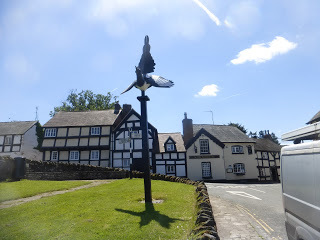
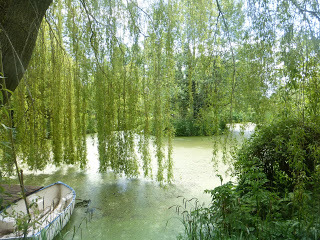


Maybe one or two of those places will feature in future stories. My research often works like that - instead of planning to see somewhere I mean to write about, I go with an open mind and hope that ideas will come to me as I absorb the surroundings and then reflect further afterwards. At present, I'm just putting the finishing touches to the next Rachel Savernake book, and it has certainly benefited enormously from visits in between lockdowns last year to places such as Hardcastle Crags and Kinver Edge, at a time when I didn't have a particular storyline in mind but was receptive to ideas suggested by unfamiliar settings.
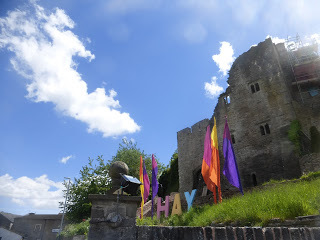
Slightly different were my various research trips before I started work on The Crooked Shore. I visited a host of places around Cumbria before settling on the particular spot that I felt provided the perfect template for Strandbeck. And memories of wandering around the county definitely helped to keep up morale as I finished that particular book during the early months of the pandemic.
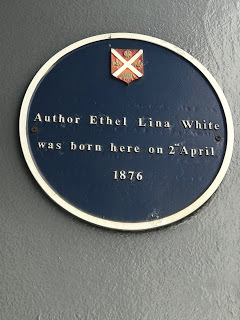
June 19, 2021
Forgotten Book - The Gigantic Shadow aka The Pipe-Dream
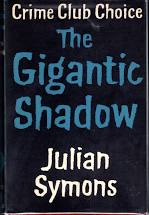
Julian Symons' The Gigantic Shadow, originally published in 1958, is an example of a crime novel which began with a single idea. As he explained many years later (in Jack Walsdorf's excellent bibliography of his work), his imagination was seized by a particular vision: that of a ruthless TV inquisitor having the tables turned on him by an interviewee, in a dramatic way that ruins the life he has known.
It's a good idea, and in the book, Bill Hunter is a feared TV 'special investigator', who is conducting a no-holds-barred interview, live, with Nicholas Mekles, a feared gangster and playboy. When Hunter asks one question too many, Mekles - who has done his homework rather better than Hunter - retailiates by revealing on air that Hunter is living a lie. His real name is O'Brien, and he has served time in prison for murder.
This revelation destroys Hunter's career and his relationship with Anna. He has to start all over again. In so doing, he begins a relationship with rich and glamorous Anthea Moorhouse. Encouraged by her, Hunter finds himself drawn into a criminal conspiracy that is destined to have fatal consequences. The story is, as Symons accepted, more of a thriller rather than a detective novel. With hindsight, he regretted having launched into the book without a clearly worked out storyline to follow the dramatic opening.
Symons was a harsh judge of his own work, but I'm afraid that in this instance he was right to regard the book as a misfire. I read it thirty years ago, but I'd completely forgotten the story. This says something about my memory, but it really is a pretty forgettable mystery. The trouble is that I simply didn't believe in Bill Hunter, either as an ex-IRA man or a TV presenter, and I didn't believe in his rather clueless exploits, either. As ever with Symons, it's a very readable story, but it's definitely one of his weakest efforts.
June 16, 2021
The Parallax View - 1974 film review
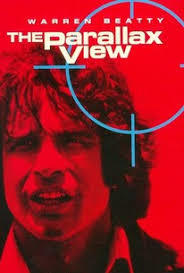
I've mentioned The Parallax View several times on this blog, but I don't seem ever to have discussed it in any detail. I've just watched it again (my third viewing) and my enthusiasm for the movie remains undimmed. It really is an outstanding example of the conspiracy thriller. Anyone who has read my Rachel Savernake books will know that I am keen on conspiracy stories (in fiction, not real life) but the fact is that some conspiracy novels and films are all too predictable. This is not the case with The Parallax View.
The film begins with a political assassination. A popular senator is shot while visiting Seattle's Space Needle (which I visited myself some years ago - fascinatingly, it was all but deserted because everyone was at home watching some big baseball match). The supposed killer is himself killed. But we know that the real gunman gets away scot free.
Three years later, a TV reporter (Paula Prentiss) who was present at the scene visits journalist Joe Frady (Warren Beatty). She claims that six people who were present at the time of the killing have themselves been murdered, their deaths contrived to look like accidents. Joe isn't convinced, but then she dies too. he begins to investigate...
I won't say much more about the plot, because you really have to watch the film, save to say that it is drawn from a novel by Loren Singer, about whom I know little. Apparently Robert Towne helped out, uncredited, with rewriting the script, which is lean and powerful. Beatty is perfectly cast. The director was Alan J. Pakula, whose work I admire; this film is right up there with his greatest achievements. Apparently the movie received a mixed reception when it was first released, rathert like Vertigo, another masterpiece. Although it was clearly inspired by high profile assassinations in the Sixties, it certainly stands up very well to the test of time.
June 14, 2021
Don't Bother to Knock - 1952 film review
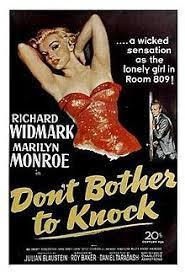 Don't Bother to Knock is a film based on Charlotte Armstrong's novel Mischief, which I reviewed . I've just caught up with the screen version, filmed in 1952 (the year after the book appeared - quick work!) with a script by Daniel Taradash. Taradash made quite a few significant changes to the storyline, but in my opinion they work well. The director was Roy Ward Baker, who made a number of entertaining movies, including Quatermass and the Pit.
Don't Bother to Knock is a film based on Charlotte Armstrong's novel Mischief, which I reviewed . I've just caught up with the screen version, filmed in 1952 (the year after the book appeared - quick work!) with a script by Daniel Taradash. Taradash made quite a few significant changes to the storyline, but in my opinion they work well. The director was Roy Ward Baker, who made a number of entertaining movies, including Quatermass and the Pit. The film derives much of its strength from the quality of the cast. Richard Widmark plays Jed Towers, a tough pilot whose relationship with Lyn Lesley is on the rocks. Lesley was the first film role for the gifted Anne Bancroft. Meanwhile, a couple who are attending an event at a hotel where Jed and Lyn meet are in need of a babysitter for their young daughter Bunny. The elevator man (Elisha Cook Jr.) introduces them to his niece Nell. And she is played by none other than Marilyn Monroe...
I think that Monroe's performance as a deeply disturbed young woman shows that she had considerable acting ability. Of course, she's a cultural icon, and very glamorous as well as tragic, but there was genuine talent there as well. Some people reckon it was her best performance, in terms of acting, and it's quite possible they are right.
The story is tense and moves at a good pace. To say too much about the plot would be unwise - it's well worth watching if you get a chance. Recommended.
June 11, 2021
Forgotten Book - Death of Jezebel
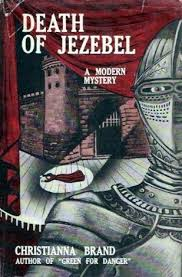
Death of Jezebel was Christianna Brand's fifth novel, appearing in 1948 (the image is of the American edition, which is the one I've read). It's set in London and it is unique in featuring both of her series detectives, Inspector Charlesworth and the better-known Inspector Cockrill, from Kent, who happens to be present at the scene of the crime while on a visit to the capital to attend a conference.
This novel opens with one of Brand's favourite devices, a cast of characters which is truly tantalising. It's a short list of just eight people, starting with Johnny Wise 'who died; and to avenge whose death two of the following also died - and one was a murderer.' So that clears up the murder motive, then, But there is still an exceptionally convoluted puzzle to be solved.
The story proper begins with a preamble set in 1940 in which we see Johnny Wise committing suicide (I have to say I felt he rather over-reacted to seeing his girlfriend canoodling with another chap, and it's not the only example of seemingly excessive emotional reactions in this novel). Then we shift forward seven or eight years. Murder takes place at a pageant, but this is a very different type of story from Victor L.Whitechurch's Murder at the Pageant, a rural country house mystery. Here the pageant is taking place as part of a charitable event at an exhibition (wittily described and slightly reminiscent of the Ideal Home Exhibition) in the Elysian Hall in London.
This is an 'impossible crime' mystery and, as she was wont to do, Brand comes up with a variety of false solutions before all is finally revealed. It's all very complicated, but even though I'm one of those who finds that Brand's style can be a bit irksome and over-done at times, overall I am most definitely a fan of her work. It displays ambition, a desire to do something fresh with the tropes of the genre. This book is not her best, but it does presents a good picture of the period. As with Christie's A Murder is Announced and Carol Carnac's Crossed Skis, post-war confusions about identity play a part in the storyline. Not an easy book to find, but worth seeking out if you can.
June 10, 2021
Publication Day - Guilty Creatures
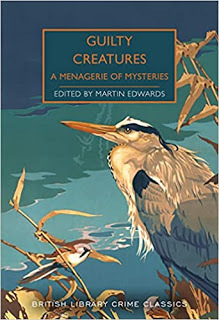
Today sees publication of my latest anthology, Guilty Creatures: A Menagerie of Mysteries. This book is another in the British Library Crime Classics series - apparently number 91! I may have lost count, but I think it's the seventeenth anthology I've edited in the series (and the next, Murder by the Book, is coming along later this year).
When I first proposed that one or two short story collections should be included in the series, I really never anticipated that I'd be asked to put together so many over the course of the last six years. And they've sold really well. There could be no better demonstration of the appeal of that under-estimated literary form, the short story.
I haven't yet received my own copy of the book, but I'm pleased with the range of stories it includes, and I'd also like to take the opportunity to thank my pals Nigel Moss, Jamie Sturgeon, and John Cooper, for making excellent suggestions about stories that might be worthy of inclusion.
And the authors? A wide range, from Conan Doyle and Fryn Tennyson Jesse to Christianna Brand (a particularly clever whodunit in the classic vein) and Penelope Wallace. Whether you're an animal lover or not, I hope you'll find some appealing stories in this collection.
June 9, 2021
Behind Her Eyes - Netflix review

I was in two minds about watching Behind Her Eyes on Netflix. On the one hand, the story is based on a novel by Sarah Pinborough and I read an entertaining thriller of hers on a plane trip, in those long-ago days when travelling by plane was a regular occurrence. That book was Dead to Her and I thought it was very skilfully written. On the other hand, I'd seen several reviews (while trying to dodge spoilers) that complained about the terrible ending of the TV series in crushing terms.
Having enjoyed Dead to Her, I decided to give it a go and make my own mind up. To begin with, the story is the stuff of conventional psychological thrillers, all about a dangerous sexual liaison. We begin with Louise Barnsley (Simona Brown) a single mother whose husband left her for another woman (and then another...) She is bored, and goes for a drink with a female friend. The friend lets her down, and Louise spills a drink over a handsome stranger. They get chatting and are mutually attracted.
Louise works in a clinic - and guess what? A new psychiatrist joins the practice, and it turns out to be the chap in the bar: Dr David Ferguson (Tom Bateman). The long arm of coincidence, huh? Before long, they begin an affair. And then, Louise bumps into David's wife Adele (Eve Hewson) and they too become very close. Again, coincidence looms large.
So far, so predictable, but no real complaints. And I must say that Simona Brown does a terrific job in quite a challenging role. But in the course of the six episodes, things take an increasingly unlikely turn. As so often with a modern six-episode TV series, one feels that the main writer Steve Lightfoot had four episodes worth of material and decided to pad them out. I began to get worried the first time that astral projections were mentioned...
I've no idea if the TV version is anything like the book, but this story is very different from Dead to Her and although my interest was engaged, I enjoyed it much less. As I've often said, I admire ambitious writing, and I suppose it could be said that the central idea here is ambitious. It's also genre-bending, but not in a way that I found remotely plausible. I like a good plot twist as much as anyone, but by definition a good plot twist has at least a touch of credibility. I'm afraid I felt the critics were right about this one.
June 7, 2021
Guest Post from Crysta Winter - Brainchild
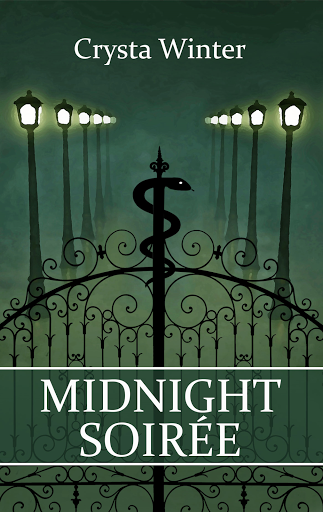
I'm often contacted by other writers who invite me to read their books and of course it usually isn't possible to accept the offer, since otherwise I'd never have time to write or read anything else. That's the unfortunate reality, but I'm acutely aware that writing is a tough game - it's a point I made in several speeches and articles during my time as CWA Chair - and I am keen to do what I can to help, provided that time permits. And this applies not just to writers based in the UK, but also those from overseas. We are all trying our best to get somewhere with our work, and the challenges are many. So when I was approached by Crysta Winter about her new book, I suggested that she might like to contribute a guest post. Here it is.
'Having savoured the enthusiasm of being allowed to publish a guest article in Martin Edwards' blog, I, a German crime writer, started searching for a topic. An activity which, as it seems to me, is the author’s main occupation. The first thing to mention would be the search for an idea. The search for a suitable crime scene goes without saying in this context. The era in which the murder is to take place must also be found, of course. Then there are the protagonists. The research, which always takes hours of searching, and last but not least the search for suitable words and sentences. I won't mention the search for a publisher here. I don't have any. I am a self-publisher.
I also have to eliminate the search for an idea from the list, at least as far as my first crime novel is concerned. On a sunny afternoon which I spent in an idyllic garden café enjoying an apple pie and hot chocolate, a male muse who turned out to be a distant friend, approached my table and addressed the momentous sentence to me. “Tomorrow I'll marry. Once again, after ten years. And once again the very same woman."
I remember vividly that my brain was abruptly flooded with a murderous cocktail of ideas that resulted in an explosive birth of a brainchild which turned out to be the grandson of my great literary love Hercule: Achille Perrot.
Both, Achille and I are nostalgic. Nevertheless, we are firmly anchored in the present. That is why Achille's cases, which he gilded with the charm of the twenties, take place here and now. And whenever a murderous mystery has to be solved, we go on a meticulous search until the case is solved to the last detail. Achille owes it to his ancestor Hercule, and I owe it to the great Dame Agatha.
As of now, you may stick to Achille's heels – either digitally or in the good old analogue way. Over a glass of white rum from the West Indies or an artesian water. Since Achille loves clarity, because clarity also means truth in a deeper sense, to which Poirot’s grandson has dedicated his body, mind and soul.'



